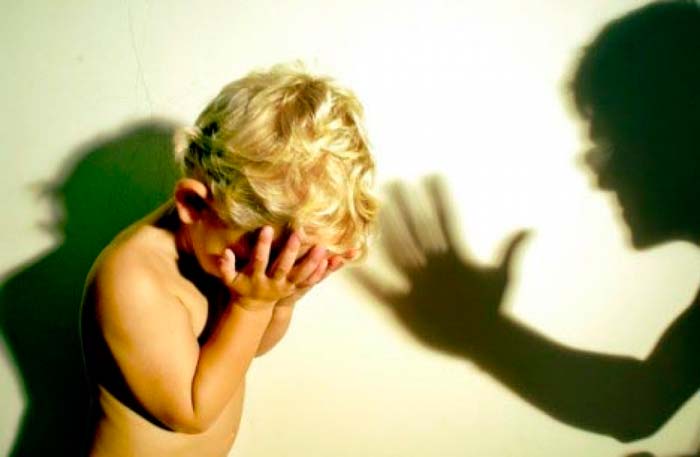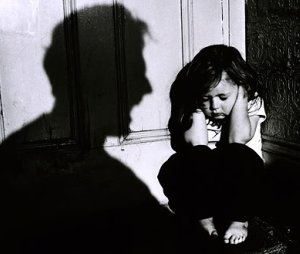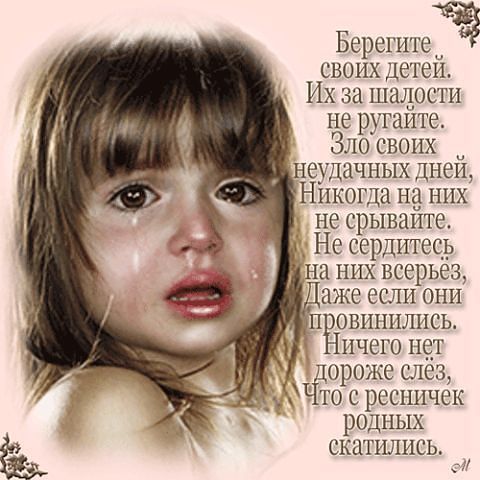Raising a child’s voice is often taken for granted: how can you somehow make him obey and recognize parental authority? In general, everyone recognizes that shouting at a child is not very good, but it is so familiar that abandoning this method of education is not so simple. Frightening to a cry, parents, in order to drown out their guilty feelings, find many excuses for such behavior: "he is guilty - he brought it," or "he still knows that I love him."

Why is screaming dangerous?
In fact, screaming is more likely to interfere with education than to help. With each shout and a rude word, the thin strands of affection between the parent and the child burst. For a child, the angry screams of mom or dad is a very traumatic situation, because at that moment the closest and loved ones become cold, angry, alienated.
Until a certain moment, the child is helpless before the screams of an adult, but closer to adolescence, conversation on elevated tones will no longer have such power over the child. It is possible that the child will begin to answer the parents the same or simply actively resist such treatment. The most serious consequence of raising a cry is that a child’s weakened attachment to parents cannot be a strong support for him in life. Such children are more influenced by other people, the family is not perceived by them as a reliable rear. Often, friends and company for a child become more important than their parents, which means that parents can simply "miss" their children.
Another serious consequence of the cry is that such a model of behavior is fixed in the child’s mind, and, becoming an adult, he will “apply it to his children on autopilot” as well. This means that the “relay race” of damaged child-parent relationships will go further.
How not to scream at the child
 Meanwhile, there are families in which children are not shouted. In these families - the most ordinary, not ideal, both children and parents. They managed to eradicate the scream and find a different approach to their children. If you are also wondering “how to stop shouting at a child” - these tips will be useful.
Meanwhile, there are families in which children are not shouted. In these families - the most ordinary, not ideal, both children and parents. They managed to eradicate the scream and find a different approach to their children. If you are also wondering “how to stop shouting at a child” - these tips will be useful.
- Give yourself the right to make a mistake. Sometimes parents are afraid to admit that they are wrong in something, believing that this will undermine their authority in the eyes of the child. In fact, it’s more important for a child to have a “earthly” parent with mistakes and mistakes than an “infallible deity.” It is very important to acknowledge before the child himself that you are only learning to be a parent, and sometimes you are mistaken and do wrong.
- A child is a mirror of parents. If we want a child to be able to control his emotions, first we must learn to manage his own, in order to become an example to him. The key word here is “manage”: emotions cannot be supplanted, “clamped”, they must be given a way out, but in an acceptable form.
- Remember that the child does nothing "for evil." He still does not know much, his movements are not clever, he is interested in everything, which is why he can scatter toys, spill milk, stain clothes, etc.Treat the child as a child and constantly keep in mind the thought "what to take from him, he is still small."
- Do not bring yourself to a breakdown and nervous exhaustion. If you feel that you are very tired and already “on the edge” - take a timeout. In such situations, you need to act as if an airplane crashed: first of all, we put an oxygen mask on ourselves, only then we take care of the child. This “oxygen mask” can be a good rest - a warm bath, your favorite book or series, shopping or manicure. Everyone has their own way to make themselves happy.
- Learn to stop when you feel very irritated and angry. At this point, it is best to switch the focus of attention from the child to yourself. According to the wonderful psychologist Lyudmila Petranovskaya, you need to learn to pull yourself together, but "handle", that is, just sympathize with yourself, regret it: you’re tired, and then the child spilled something, now you’ll have to wipe it. And what demand is there from the child - he is still small. This technique helps to stop in time and understand that the cause of the scream is not the child’s actions, but your own tiredness.
- Try to understand how the child feels when they shout at him. In trainings for parents there is such an exercise: one participant squats, and the other stands next to him and reports. A few minutes are enough for the person to cry and feel intense fear. Usually, after such an exercise, parents are much less likely to raise their voice on the child. However, even without exercise, you can try to understand the feelings of the child. In general, understanding the feelings and emotions of a child helps him to figure out his own experiences and teach the child how to regulate his behavior.
- In any situation, keep in touch with the child, show respect for him. The child should feel that even if the mother is angry, they are still “on one side of the barricade”.
- Do not ignore your own feelings. Hygiene of one’s own feelings is a very grateful occupation, because when a mother can sort through what, why, and how she reacted with a cry, she learns to manage these feelings. Be sure to give vent to these feelings through tears, words, creativity, or in another way.
- Come up with some kind of image or phrase that will help keep yourself from screaming. You can associate yourself with the "big elephant mother", which cannot be pissed off as childish pranks, or repeat some kind of mantra.
- Set priorities correctly. Do not forget that upbringing is, first of all, a relationship with a child. Children grow up, and, after a while, educational functions will disappear from the life of their parents, only relationships that develop over the years will remain. What it will be - warmth and intimacy or resentment and alienation - depends on the parents.
Recommended on the topic:
- What should I do if I constantly scream at my child? – Read a simple tip here;
- Top 10 Parent Mistakes in Parenting – https://kid.htgetrid.com/en/psihologiya-detey/top-iz-10-oshibok-roditeley-v-vospitanii-detey.html;
- How to tell a child "DO NOT" – https://kid.htgetrid.com/en/psihologiya-detey/kak-pravilno-govorit-rebenku-nelzya-i-net.html;
- 25 tips for raising a child in love and peace – https://kid.htgetrid.com/en/psihologiya-detey/25-sovetov-kak-vospitat-rebenka-v-lyubvi-i-spokoystvii.html;
- How to react and deal with the vagaries of a child – https://kid.htgetrid.com/en/psihologiya-detey/kak-reagirovat-i-borotsya-s-kaprizami-rebenka.html.
Parents who are ready to make efforts to work on themselves and refuse to scream in raising a child deserve great respect. They are doing a great job, the echoes of which will reach both their grandchildren and the next generations, because a child who grew up without screaming and becomes a parent himself is unlikely to scream. Moreover, a calm upbringing, paradoxically, makes children more obedient. It is vitally important for a child to be close to “his” adult, and obedience is a thing provided by nature. Looking at calm parents, the child himself learns to cope with his emotions and regulate his behavior.
Read on:
Watch the video: How to learn not to shout at children
They shouted at the child ... What should I do?










Shouting and raising a voice in any case will not lead to anything good. It is better to treat the child as an adult, and calmly explain what he did wrong, why it is bad, and what is better to do in the future
Before, I often screamed at my daughter, with or without reason, as a result, she began to move away and became attached to the kindergarten teacher, who was affectionate with her. At first I didn’t pay attention to it, until my daughter called the teacher her mother and said that she loved her, not me. I was so shocked that I began to shout less at her, but it’s not so easy, but I try and now I am actively building relationships with my baby and there is already a result.
Very helpful article. I immediately remembered my childhood. My parents raised me not quite correctly, though I do not hold grudges against them, you cannot judge my parents, but all the same, domestic quarrels had a very negative effect on my nervous system. I believe that for their child, parents are the closest people in the world who cannot be replaced by anyone, and the way we put ourselves in front of our children will be the same for us throughout our lives. Do not offend your children, do not shout at them, the best way out of any situation is to become your closest friend for your child, show him your love and care, so that he feels that there is no one closer to him in the whole world than you - him parents.
When a parent yells at a child, he confesses his helplessness.
“What to take from him, he’s still small” - I don’t agree here, the phrase goes in the section “Remember that the child does nothing“ for evil ”. ”Children are sometimes very good at manipulating their parents! And then the behavior is “evil”!
Recently, I began to notice that I’m screaming at my oldest daughter of 9 years old every day. I don’t even scream, but yell. And there is no reason for this! I scream so that my throat starts to tickle and hurt. It comes to the assault. The bruises from me remain. I admit that I’m not mentally stable, and all the irritability, setbacks and negative influence of strangers at work spills over to her. Then a terrible guilt and self-flagellation. This is scary. A stranger said about me about a long time ago about 8 years ago that children should not be raised like that. When I heard how I wildly communicate with my daughter. I feel very sorry for her. But I realize that I am crippling her life, and I continue to do this consciously. It's horrible! I do not want bad for my child. I want her a happy and safe life. But my upbringing does not lead to this.